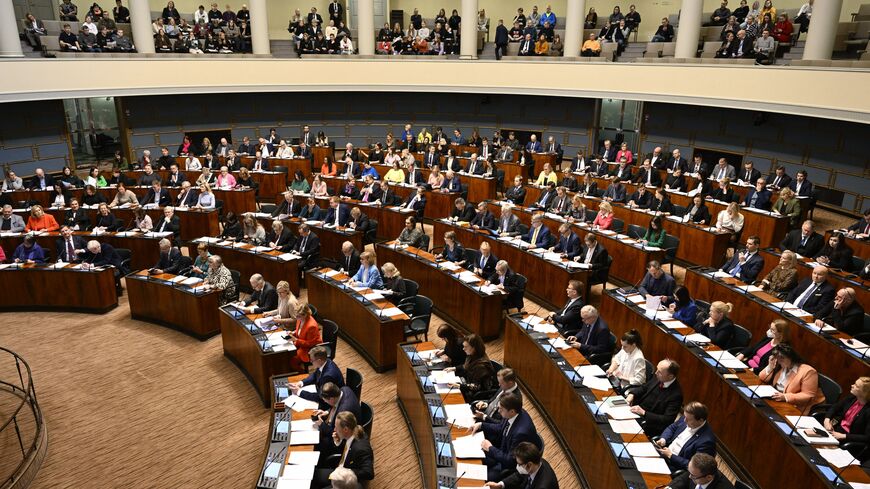ANKARA — Turkey’s parliament ratified Finland’s accession to NATO on Thursday, while Sweden’s bid to join the alliance is still blocked by Ankara and Budapest.
The measure passed unanimously with 276 votes in the parliament’s general assembly.
In a video message on Friday, NATO Secretary General Jens Stoltenberg hailed the move. “Finland will formally join our alliance in the coming days. Their membership will make Finland safer and NATO stronger,” he said, adding, “We have seen the fastest ratification process in NATO’s modern history.”
Finland and Sweden were formally invited to the North Atlantic alliance in June following breaking their historical military nonalignment policy in face of the Russian invasion of Ukraine last year. Initially, Turkey gave its nod for them to become official invitees, but tabled a series of national security demands before ratifying their accession. NATO’s decision-making process requires consensus among all 30 member states.
The pro-Kurdish Peoples’ Democratic Party (HDP), the second-largest opposition bloc in the parliament, remained absent from the vote, but criticized the Turkish government’s position during the three-way negotiations between Turkey, Finland and Sweden over Ankara’s requests for a crackdown on Kurdish activists. Turkey’s demands from the Nordic countries include restriction of Kurdish activists in both countries and extradition of individuals whom Ankara deems terrorists.
Speaking at the parliament on Thursday, HDP lawmaker Hisyar Ozsoy accused the government of turning the NATO talks into “blackmail” for extradition of dozens of activists, authors and intellectuals. He said that his party had never supported a bill that enhanced militarization and never would.
Ankara’s extradition demands for the majority of those people are based on their alleged links to the outlawed Kurdish militants who have been fighting against the Turkish government for self-rule since 1984. The issue remains the major snag in talks between Stockholm and Ankara.
Former Ambassador Ahmet Kamil Erozan, a lawmaker with the country’s opposition Good Party, meanwhile, said the government delayed Finland's bid for political purposes.
“The process has been managed clumsily,” Erozan said.“The comments of our president [on the issue] have always been aimed at domestic political consumption,” he told the parliament.
Turkey’s requests from Finland were relatively easier to implement in comparison to those it asked from Sweden. Following minor amendments in its terrorism laws pertaining and removal of a de facto defense sales embargo on Turkey, Helsinki met the majority of Ankara’s demands, paving the way for the ratification. Erdogan announced the formal initiation of the ratification process earlier this month during Finnish President Sauli Niinisto’s state visit to the country.
Turkey was the sole NATO member that was stalling the Nordic country’s accession following Hungary’s ratification earlier this week.
Sweden has also taken several steps to address Turkey’s concerns including amending its laws on terrorism. Stockholm also spearheaded a series of moves to support Ankara’s post-disaster efforts following the twin earthquakes that killed more than 50,000 people in Turkey. The Nordic country, however, has been unable to flex Ankara’s position.
Ankara’s most contentious request from Stockholm is extradition of more than 100 people over their alleged ties to terrorism. The two countries’ laws on terrorism differ highly.
Speaking alongside Niinisto, Erdogan said his country’s talks with Sweden would continue. “How the process will progress will be directly dependent on the concrete steps that Sweden will take,” he said.
Niinisto, whose country has been pressing for joint accession, for his part, expressed his solidarity for the Swedish bid, saying Finland’s accession to NATO would “not be complete without Sweden.”
The Turkish government’s decoupling of the two bids met with implicit objections within the Turkish parliament as well.
Former Ambassador Unal Cevikoz, lawmaker with the country’s main opposition, said Sweden has been one of the European Union countries that tried hardest for Turkey’s EU membership over the past 10 years.
“We made a distinction between Sweden and Finland, but I hope that by making this distinction, we have not alienated the Swedish people from ourselves,” he said.
Finland shares a 1,340-kilometer (800-mile) border with Russia, which has invaded the country twice in the 19th and 20th centuries.
Along with Turkey, Hungary has also yet to ratify Sweden’s bid, despite pledging to do so repeatedly. NATO and Washington are seeking for joint accession ahead of the alliance’s upcoming leaders’ summit in Vilnius on July 11-12.
Speaking on Friday, Stoltenberg reiterated his call for the Swedish bid. “I look forward to also welcoming Sweden as a full member of the NATO family, as soon as possible,” he said.
Following Turkey’s ratification, Finland’s NATO membership will be finalized by the US State Department and the Finnish authorities under the Washington Treaty.
This is a breaking story and will be updated.






